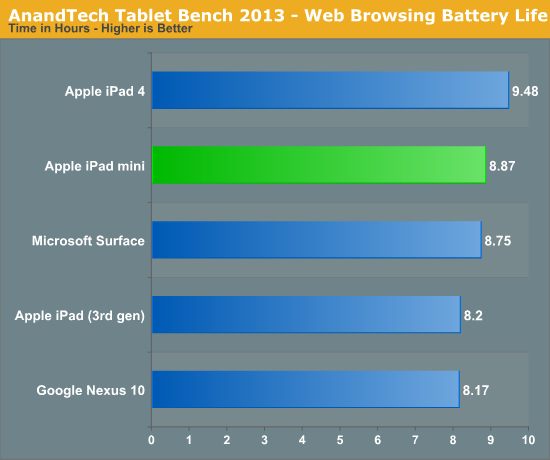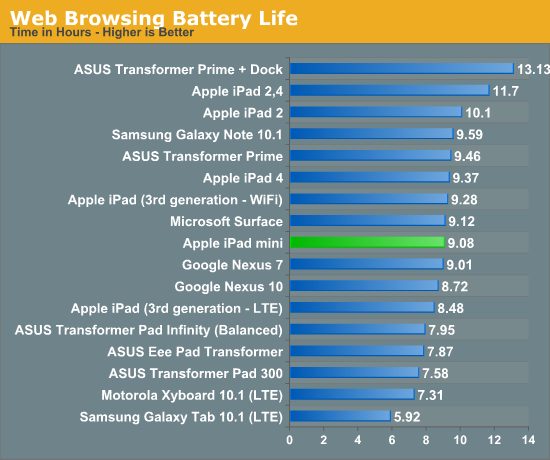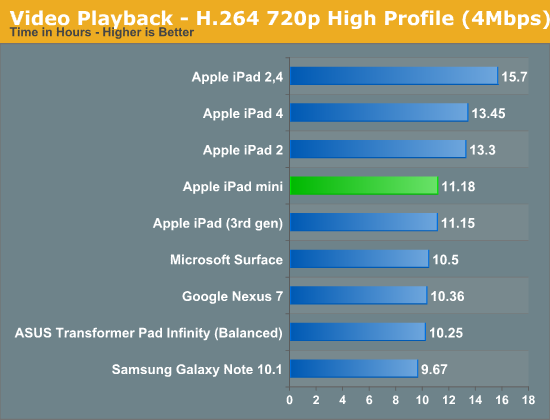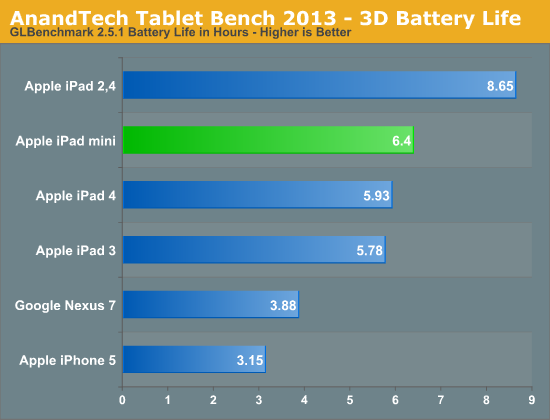iPad mini Review
by Anand Lal Shimpi & Vivek Gowri on November 20, 2012 6:10 PM ESTBattery Life and Charging
The iPad mini features an integrated 16.3Wh battery, easily smaller than the 43Wh unit in the iPad 3/4 but even smaller than the 25Wh used in the iPad 2. Given that the mini has roughly the same internals as the iPad 2,4, but with a substantially smaller battery, you can expect a corresponding decrease in battery life. The display is also smaller, which should reduce some of the power requirements a bit.
We've started running our new smartphone web browsing battery life test on tablets as well. If you missed its introduction in our iPhone 5 review, here's a bit about the new test:
We regularly load web pages at a fixed interval until the battery dies (all displays are calibrated to 200 nits as always). The differences between this test and our previous one boil down to the amount of network activity and CPU load.
On the network side, we've done a lot more to prevent aggressive browser caching of our web pages. Some caching is important otherwise you end up with a baseband/WiFi test, but it's clear what we had previously wasn't working. Brian made sure that despite the increased network load, the baseband/WiFi still have the opportunity to enter their idle states during the course of the benchmark.
We also increased CPU workload along two vectors: we decreased pause time between web page loads and we shifted to full desktop web pages, some of which are very js heavy. The end result is a CPU usage profile that mimics constant, heavy usage beyond just web browsing. Everything you do on your device ends up causing CPU usage peaks - opening applications, navigating around the OS and of course using apps themselves. Our 5th generation web browsing battery life test should map well to more types of mobile usage, not just idle content consumption of data from web pages.

The mini actually outlasts the 3rd gen iPad in our heaviest WiFi web browsing battery life test, but the 4th gen iPad's move to a 32nm SoC solves that problem. Under load however both the new iPad and the mini are fairly close in terms of battery life.
We haven't yet rerun our new test on all of the tablets, so we turn to our older 4th gen test to provide some additional reference points:

If we look back at our older test we get good perspective on everything. The iPad 2,4 still remains the king of single battery tablets, and the mini just barely makes it over 9 hours of use on a single charge. The mini still lasts long enough for it to be more of an all-day device than a notebook.
Our video playback test remains unchanged from previous tablet reviews. Here I'm playing a 4Mbps H.264 High Profile 720p rip I made of the Harry Potter 8 Blu-ray. The full movie plays through and is looped until the battery dies. Once again, the displays are calibrated to 200 nits:

Apple's video decode hardware implementation has always been stellar, as a result the mini manages to do very well here. At over 11 hours of video playback on a single charge, the mini is only bested by some of its larger iPad brethren. The iPad 2,4 remains insanely awesome here.
Our final cross-platform battery life test is the new GLBenchmark 2.5.1 Egypt HD test. Here we have a loop of the Egypt HD benchmark, capped to 30 fps, running on all of the devices with their screens calibrated to 200 nits.

I no longer have a 45nm iPad 2 so I don't have results for it here, but the combination of the small 1024 x 768 display and 32nm A5r2 silicon gives the mini better battery life than the iPads equipped with a Retina display. The iPad 2,4 continues to offer amazing battery life here.
The GLBench battery life test gives us a reasonable minimum for the iPad mini's battery life, with the video playback test giving us a good maximum. You can expect to see 6.4 - 11.2 hours out of a single charge from the mini.
The mini comes bundled with a 1A charger identical to what you get with an iPhone 5 or a 5th gen iPod Touch. Using the new Lightning connector it'll take about 4 hours to complete a charge on the iPad mini.










140 Comments
View All Comments
Zink - Wednesday, November 21, 2012 - link
http://www.youtube.com/watch?v=5MMmLQlrBwstwtech - Tuesday, November 20, 2012 - link
I hope Google keeps the same screen size for the next 7" Nexus, but trims into the border a bit on the sides. Right now it's right at the limit for wrapping a hand around it, and I have pretty big hands.Crocography - Tuesday, November 20, 2012 - link
And also its all metal back is too slippery compared to the Nexus 7. I waited for both to be release before I bought the Nexus 7 32Gb. (bought one by selling my iPad 2013 model -- never really used it much)jjj - Tuesday, November 20, 2012 - link
If Apple is Apple they should have made this higher end and price it at 400$, and that still is what Job's Apple would do.Next year with the ipad 2 gone,they would need to drop the ipad 4 to 400$ or retire it so covering the 400$ range with the mini would make more sense.The cost of the SoC is a relative thing,32nm yields will get better by then,keeping it thin could be problematic if they double the res.PS; i am in no way suggesting this would be a price worth paying, just sayiing what would Apple do.
dishayu - Wednesday, November 21, 2012 - link
Is it possible Apple made the iPad mini worse than they were capable of, right now, just so that they can effortlessly update it and make more money out of it?ltcommanderdata - Wednesday, November 21, 2012 - link
Like any product designer, Apple has got to optimize for a variety of factors including component availability, component cost, final sale price, what features customers want, what features customers can tolerate not having, etc. If they just cared about maximizing profits they might as well have just thrown in the A4 from the iPhone 4 and a larger version of the TN panel used in the iPhone 3GS since they share the same dpi anyways.The iPad Mini already has worse battery life than the iPad 2 even without a retina display. Adding a retina display and a faster SoC to drive it will make this even worse unless a larger battery is included. One of the main features of the iPad Mini is how thin and light it is, even thinner and lighter than competing 7" tablets despite having a larger screen. Gaining a retina display in exchange for a thicker, heavier tablet may silence some complaints but will only create new ones. What's worse, a thicker, heavier design might make the iPad Mini difficult to hold given it's thin bezel design with limited grip area, so is a non-starter given current technology in 2012. Hopefully Anand is wrong in his prediction that a Retina iPad Mini isn't possible in 2013 either and that improvements in display tech, battery tech, and a move to the Samsung 28 nm process for the SoC will make it happen.
marcolorenzo - Wednesday, November 21, 2012 - link
Whilst I'm sure it was possible for Apple to include the retina display and the A6 SoC, it's more likely that they chose not to since it would make the device bigger and heavier due to the bigger battery it would require. Apple was simply not willing to make that sacrifice. Next year when the technology is more mature, they will implement it.drx11 - Sunday, November 25, 2012 - link
--------------------------------------------------------------------------RE: On purpose by marcolorenzo on Wednesday, November 21, 2012
Whilst I'm sure it was possible for Apple to include the retina display and the A6 SoC, it's more likely that they chose not to since it would make the device bigger and heavier due to the bigger battery it would require....
--------------------------------------------------------------------------
Exactly - this is the iPad 4 (gen)!
aravenwood - Wednesday, November 21, 2012 - link
Anand,Thanks for the article, but the most interesting thing you mention never gets explored at all in the article. On the first page you say:
"But here’s the thing - I don’t consider the iPad mini a competitor to the Nexus 7. The Nexus 7, to me, is what I buy if I’m in the market for a $199 tablet or I want a 7” Android device. It’s a completely different experience than the iPad mini. In my mind, the closest competitors for the iPad mini are, in order, the iPad 2, the Kindle Fire HD 8.9”, and the Nook Tablet HD+. The iPad 2 is obvious because these are the two lowest priced iOS tablets right now, and with similar underlying hardware, they’re actually pretty closely matched. I think the latter two are especially interesting comparisons to make, because all three exist in the ~$300 “small premium tablet” niche that has suddenly appeared."
You say that the comparison with the Nook HD+ and Kindle are the most interesting comparisons, in a small premium tablet niche, but you never come back to this. Can you elaborate on this, maybe in a followup article? I for one have basically discounted the iPad Mini, and the kindle in favor of the Nook HD+. I haven't bought it yet, but I am leaning heavily - the only drawback is the lack of camera and GPS. The price, quality of screen build quality is compelling. In general I feel that Nook HD/HD+ doesn't get the respect it deserves. I have been holding off because I can't any serious (e.g. Anandtech type) reviews of the device and i want to read some real discussion of it's qualities and get a no-bs assessment of the good and bad and comparison to the Kindle and nexus 10.
So that's my Thanksgiving wish - if you have down time, can we please have a review of the Nook HD +?
Thanks,
Michael
MadMan007 - Wednesday, November 21, 2012 - link
Seconded. The Nooks and Kindles may be some of the more popular tablets among the less tech savvy. They aren't the fastest or most up to date, but they do have nice feature sets, and B&N doesn't overcharge for built-in storage upgrades. The Nook HD+ and Fire HD 8.9" both have very high resolution screens. Maybe the custom software makes them harder to review? I still think it's worth it even if they aren't directly comparable to other tablets for that reason, plus you could explore loading custom ROMs if possible (I didn't bother to look up whether they are hackable)